|
It's a great LP, csm. I don't think about it often, if I'm honest, but I'm always happy to see an update. There are tiny exceptions, but I've enjoyed 99% of it. I honestly thought that there was no real end to this LP and that you were just adding stories as whim dictated, but I'm glad that you have an end goal. I want to see this preserved in the archives as I've seen too many LPs die on the vine. The fact that you have a backup website if very comforting. Just as an example, there's an LP of an RPG on this forum that's been one update from done for about two years and I doubt that we will ever see its completion and archivation.
|
|
|
|

|
| # ? Apr 19, 2024 12:15 |
|
I’ll just also chime in to say thank you for your LP, I’ve really enjoyed it.
|
|
|
|
I've had this thread bookmarked with no posts for over a year and I'm glad I kept it.
|
|
|
|
Over a year since the last update and worth the whole wait. Always glad to see an update of this. Even if it's been a long while, it's like a surprise gift!
|
|
|
|
hell yeah
|
|
|
|
gently caress yeah, another update!
|
|
|
|
see update, release happy chemicals
|
|
|
|
Ah, just drowning him out with a hail of bullets, not rubbing him out with a hail of bullets, at the end of the prior update. Glad to see this keep going.
|
|
|
|
Yeah, I'm glad to see its still here. 
|
|
|
|
This is one of the half dozen threads I still keep up with. I am ride or die like everyone else.
|
|
|
|
Chapter Sixteen: The White Elephant (July-August 1946) Dear Ms. Perkins, 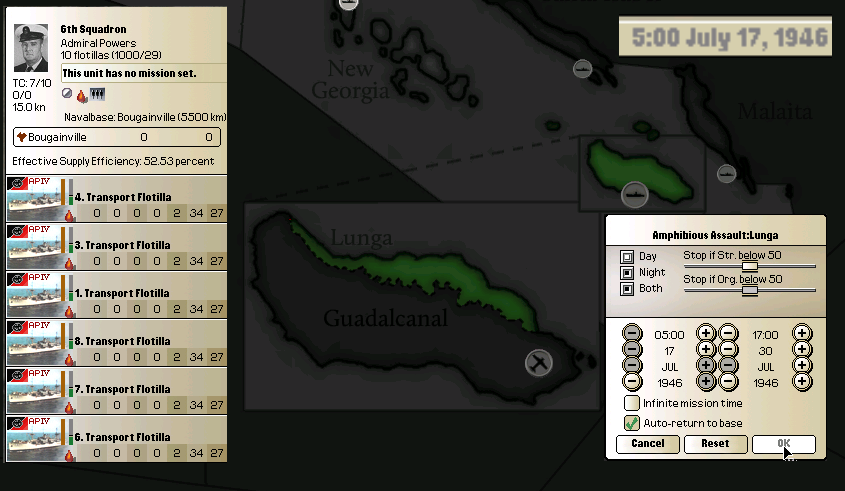 I was thrilled to see your package in the mail delivery. I was just remarking to a comrade that the mountains being so close to the sea reminds me of Seattle. And thinking about Seattle reminds me of you. Thank you very much for sending those encyclopedia pages. I cannot say that I would think to send somebody the entries for seven different islands because I didn’t know which one they were going to. This is the kind of thorough planning and care that everyone loves you for, Ms. Perkins. I remember well our conversation when I told you I intended to enlist. You told me that it was not your place to forbid me, but that you hoped I would at least honor your wish that I learn everything I possibly could on this tour. I have taken your exhortations to heart. I read every page multiple times. I had even begun to hope that we were destined for Guadalcanal, as the page states venomous snakes are rare there. You remember how much I dislike snakes. 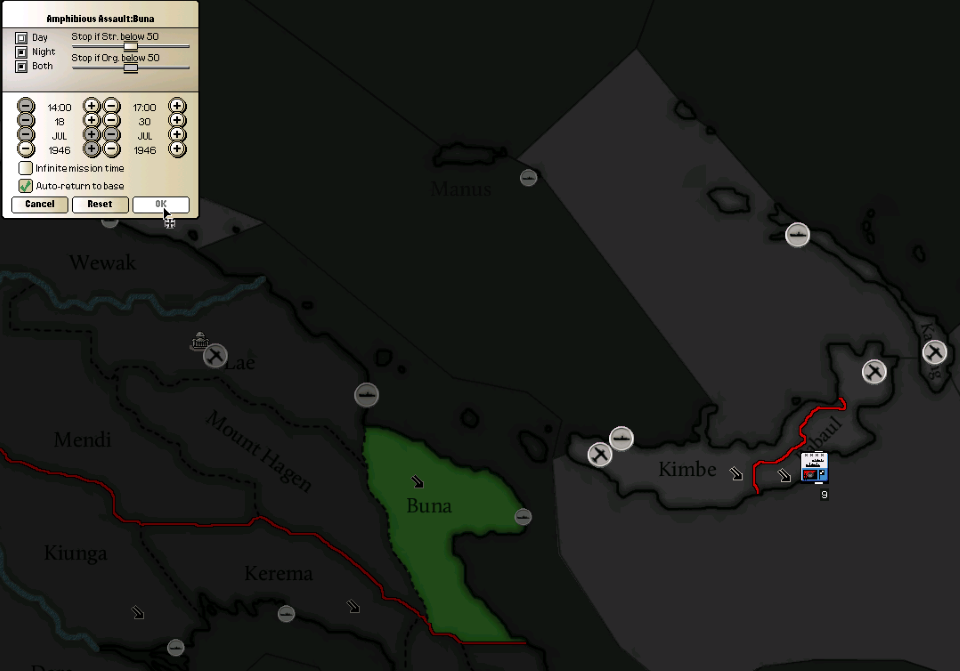 Unfortunately, venomous snakes are more common on New Guinea, which is where we ended up.  We landed near a village named Buna about three weeks ago. We were told in briefings that Buna was a crucial bit of land to control, as it was a crossroads between the German and Australian quarters of New Guinea. People speak of Chicago as the crossroads of America, with all the trains going to every corner of the continent, freight coming in and out in unimaginable volumes. Obviously, I did not expect the same from Buna. There are only a handful of cities on the Earth which rival our capital. But I was expecting something! A single railroad! Pavement! I was unprepared for how undeveloped this place is. It seems Buna is a crossroads in that it is the northern end of one of the handful of paths that cross the forbidding mountains to our south. German New Guinea has loomed large in our imagination these past two years since the Prague Pact was defeated. Some of the papers imagine it as a festering sore, a dark corner where the Kaiser lives to fight another day, to suddenly appear in Europe and turn back all of our victories like Lawrence threatened to do. 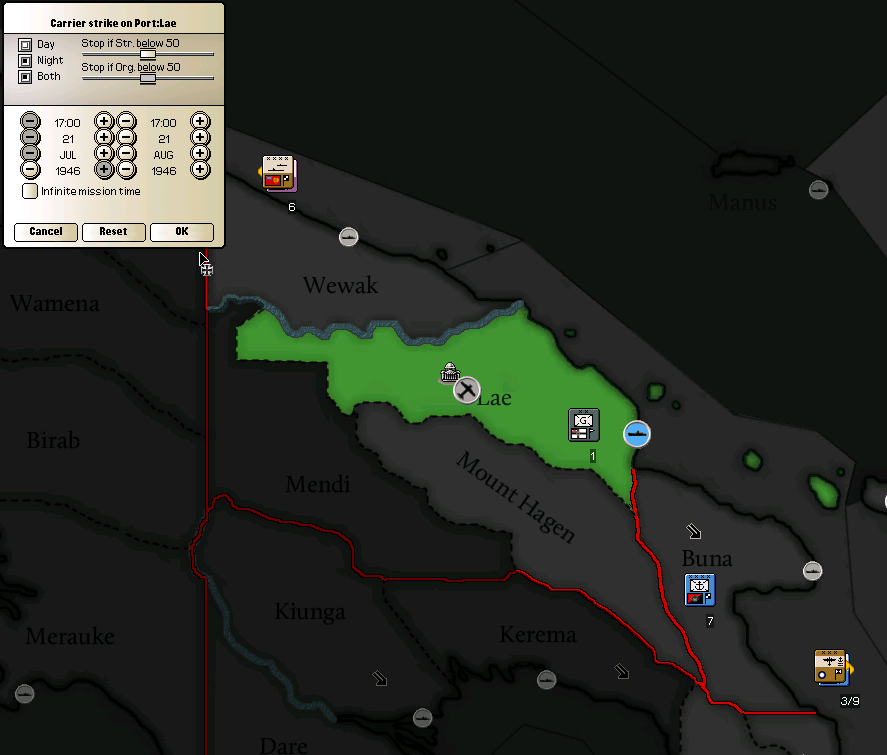 It makes me want to turn back time and box the ears of anybody who was seriously concerned about the threat of the refugee German High Seas Fleet. I have seen Norfolk and San Diego for myself, and seen photos of Wilhelmshaven, Scapa Flow and Toulon. The amount of resources and infrastructure required to sustain an ocean going navy are immense. None of that exists here. This island’s facilities in their current state would be stretched to run a Coast Guard station. A simple reading of this island’s history would puncture the fantasy of a Pacific Wilhelmshaven. The Dutch, Australians and Germans divided up this island simply because there was nothing left to divide up. This was not a new home for the German Empire. It has been its hospice. The fact that anybody has said otherwise leads me to believe they are either fools or liars. You told me that first-hand knowledge of the world is an armor against propaganda. If I had known that this place was so primitive in its infrastructure, I would have screamed at the top of my lungs at every delegate who swore it was vital we capture this place. 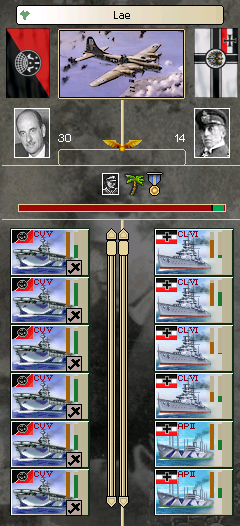 No matter how pathetic their situation is, we are still here with the objective of putting a final end to the Prague Pact. So that is what is going to be done. 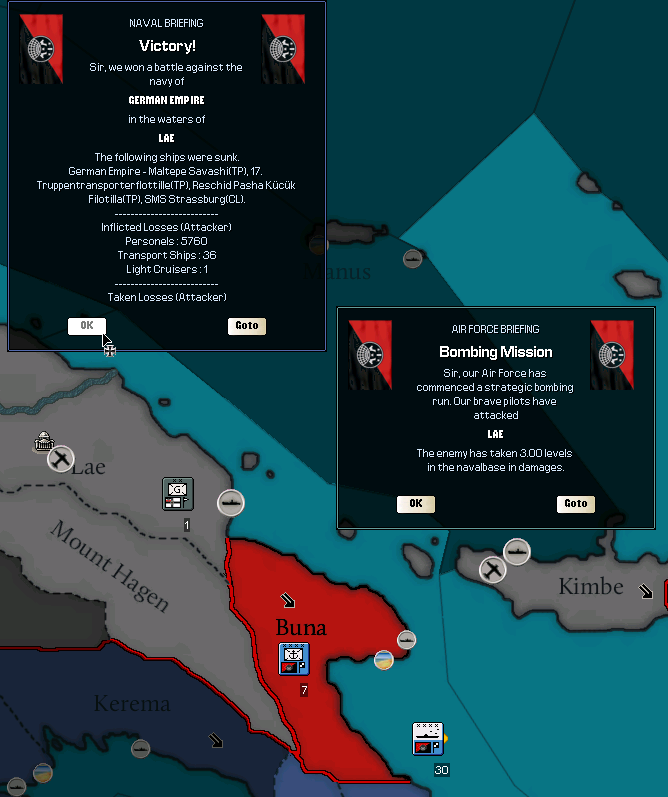 It is all a tremendous waste. I curse them for not giving up sooner. Everything that we blow up could be put to so much better use. Perfectly good ships blown to pieces. Perfectly good men killed as Germany and Turkey face labor shortages. Nearly all the world struggles for lack of workers and materials, and here we are destroying both. 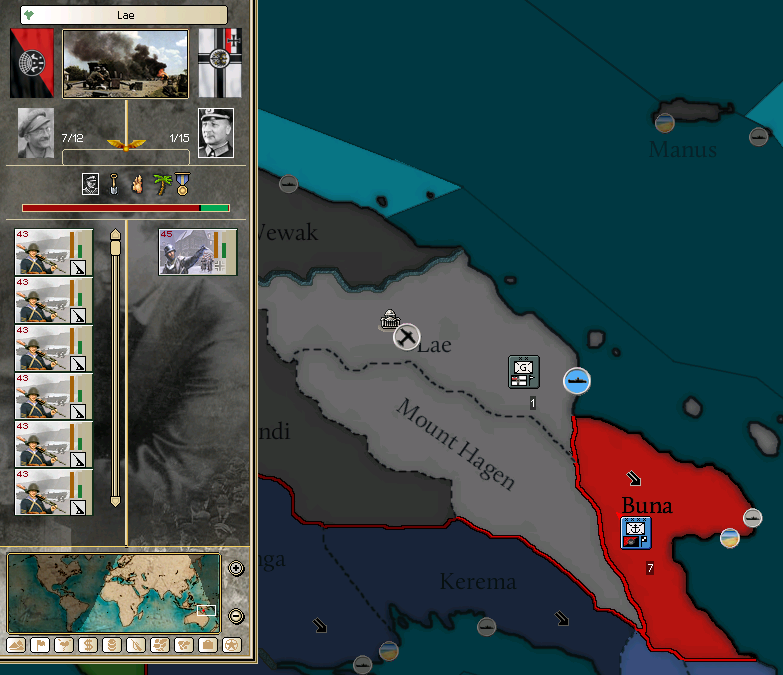 Some of the landing force stayed behind in Buna to guard our rear while we advanced upon Lae. The Germans defending Lae were not lacking for motivation but were lacking for anything else. 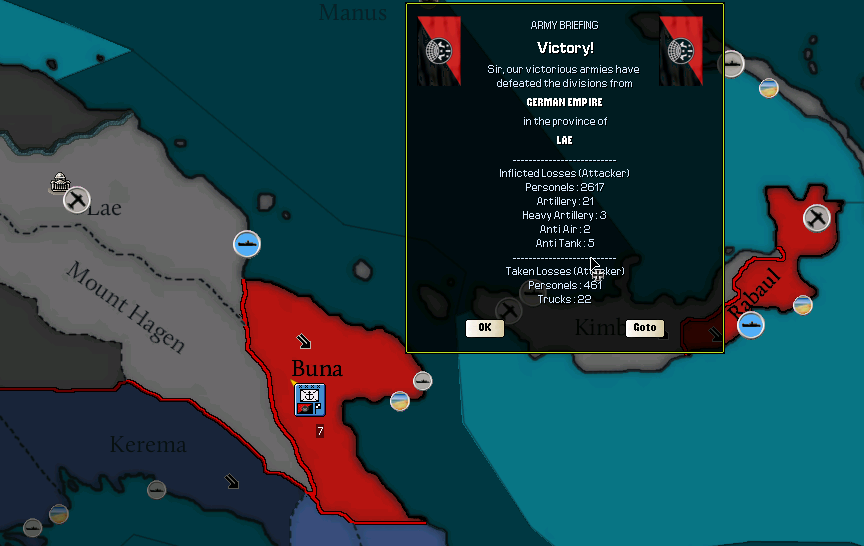 They tried but were overwhelmed and outgunned immediately. I was expecting a torrent of casualties in the field hospital, but fortunately we only received half of what we were expecting. Many were content to surrender once they realized there was no hope. They had fulfilled their duty. For others, a death in service to the Reich was the only thing they had left. 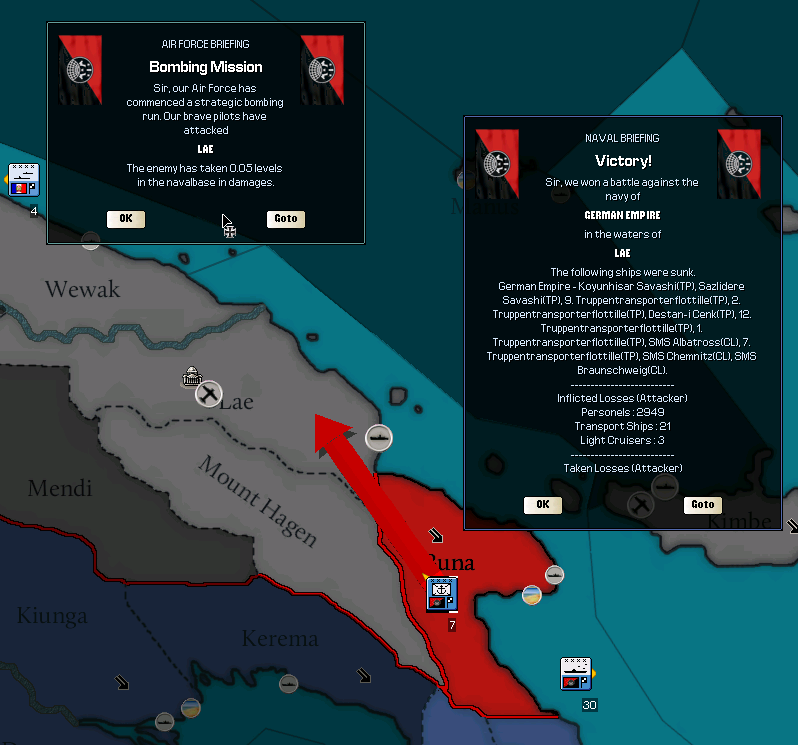 Lae itself was a smoky mess when we arrived. The port facilities were rudimentary at best and much of the refugee fleet had been moored out on the water, where they now sit sinking or burning. Most of the locals appear to have fled inland and are waiting for us to go away. They had once come to the coast looking for work and trade from the colonists, but we’re told the economy has not functioned since the Red Navy began sinking convoys back in ’42. Once, the airfield nearby handled shipments of gold from the mines in the highlands, but those gold planes have flown directly to Australia for some time now. We have our work cut out for us, putting out all the fires in the harbor and preparing to deport the Germans. The Kaiser’s “palace” is north of here. It is apparently surrounded by booby traps and anti-aircraft guns, as the Germans were convinced that assassination by covert infiltration or aerial bombardment was imminent. He is not there. The handful of locals left tell us that a large number of Germans went inland towards Mount Hagen, and that the Kaiser is likely among them. Anything to do with the Kaiser is strictly confidential. Some high-strung intelligence types have been running around town and get anything they want without question. I assume they are after the Kaiser. I do not care. I don’t understand the obsession with one man. For the past two years, he has been Emperor of a mirage. As soon as we got close, it was obvious that there was nothing here at all worth worrying about. The German Army, or what’s left of it, should be hunted down and made incapable of inflicting violence, of course. We cannot let them abuse the locals any longer. But the Kaiser himself? We should deport all of his soldiers, strip him of all his servants and material wealth and let him try to make his way with nothing but the land that bears his name. Here, so far from industry and modernity, we can see if he is really God’s most favored. Of course, I know that the Internationale will not be spared their prize. He lived life as a symbol and will die as one too. With all of these thoughts storming around my brain, I at least take solace in the beauty of this place. Leon stayed behind in Buna, so I have not seen him for a few weeks. In my off hours, I have taken to helping one of the men develop his photos of the birds here. They are quite beautiful, with such fantastic plumage like you’ve never seen. He hopes to compile a book. If he does, I will be sure to get you a copy. I am being told that I better finish this letter quick if I want to get it on the next plane out, so I will leave it at that. We are, hopefully, one step closer to the end of all this. I cannot wait to see you again. Yours, Sam ~*~*~ Chicago “Chairman’s Office, connecting in China Embassy. China Embassy, please be aware others will be joining this call, thank you.” “Thank you, ma’am. Chairman Gitlow, to what do I owe the pleasure?” “Good evening, I will wait for the others and let you know, I promise. I will not take up much of your time.” “Chairman’s Office, connecting in Japan Embassy. Japan Embassy, please be aware China Embassy is already on the call, thank you.” “China? What?! I already told you, Chairman, we are not interested in having you as a broker!” “Please, calm yourself, Mr. Sekimoto. You do not have to speak to the ambassador from China at all if you wish. We are waiting for one more, I will tell you what I need to tell you all, and you can go about your business. I promise.” “Chairman’s Office, connecting Siam Embassy. Siam Embassy, please be aware China Embassy and Japan Embassy are already on the call. All callers have arrived, operator disconnecting. Have a good evening, gentlemen.” “Thank you, operator. Mr. Chairman, I cannot imagine what you are bringing the three of us together for.” “I suppose I should just get right into it then. The news will leak soon enough anyway, it always does. We have apprehended the Kaiser.” “That’s very good for you, Mr. Chairman, but what does it have to do with us?” 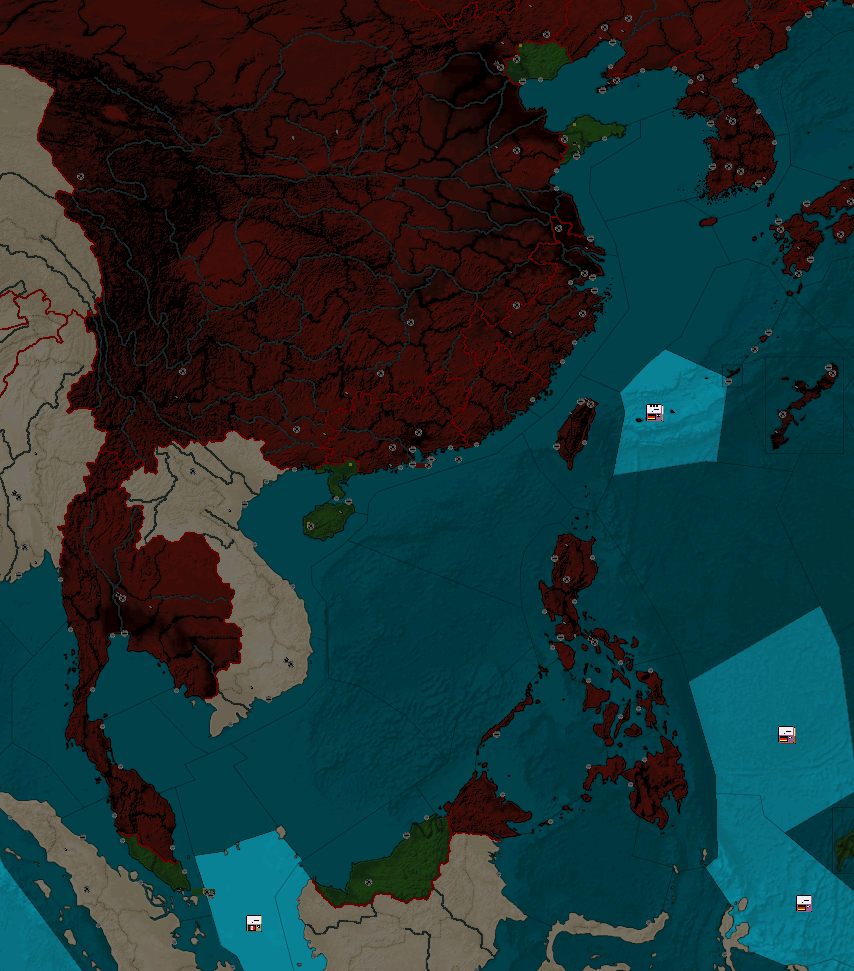 I tag switched and declared war on the Germans as all these countries. It seemed foolish that I would have to invade all these victory points at long range when the neighboring countries surely would have seen fit to just take them for themselves by now. “With the Kaiser’s arrest, we consider the Reich to be defunct, and our war with them to be officially over. This means all previous guidance regarding occupation of Reich territory is retracted.” 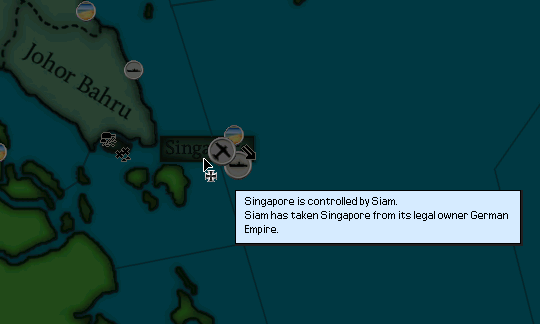 “So… hypothetically speaking, of course, if we were to occupy Singapore, your government would have no objections?” “That is correct. We will be making an official broadcast within the hour, and further details will be forthcoming. But I thought it was important that you hear this from me directly before it is publicly known, in hopes we can avoid any confusion and chaos. That is all I have to say for now. Please forgive my abruptness, but as you can imagine, things are about to get very busy for me. Good evening, gentlemen.” Call disconnected. ~*~*~ Paris Nestor Makhno was bothered by the possibility that he had underestimated him. Lots of people had underestimated Gitlow, but mostly for not having the charisma of his predecessor. Anybody with a brain knew that Gitlow was a savvy operator. He had to have been, to keep Chicago relatively placid for all these years. But Makhno had gotten the impression he was tired, and that events were passing him by. There was a yearning throughout North America for the seeds of revolution to blossom in a new era of peace, just as there was in Europe. Makhno had seen it with his own eyes. Millions coming to hear about the New Europe when he toured North America on his way to the Mexico City conference. But old Ben seemed to have tunnel vision, only concerned with keeping the Chamber on board with extending the wartime emergency into its eleventh year so he could achieve a final victory that fewer and fewer of his charges seemed to even care about. On the other hand, a lot of Americans had gotten on board with armed paranoia after the Laurentian counter-revolution. The consensus on the Continent was that the Republican Army had been a sword of Damocles left to dangle without purpose over the head of the Union. Surely, if you are afraid of counter-revolution, it is best to dismantle the professional army and return all power to the assembled workers, now that the threat has passed. Once Hawaii had been conquered, there was no longer even a minor threat to the North American continent. Maybe the majority of Americans really did want to see the King and Kaiser hunted down for good more than they wanted the fighting to stop. The talk of Paris was that Gitlow had lost his touch and was letting the inertia of the war carry him forth rather than dive into any of the messy questions about what peacetime even looked like. But maybe Gitlow had not gotten complacent. Maybe he was sharp as ever and just seeing through what was expected of him by the majority of Americans who had not come to see Makhno. 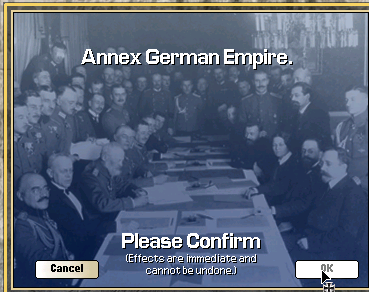 Whatever the case may be, Gitlow had done the exact thing that would most disrupt the European project in its infancy. Without even consulting Makhno, or anybody else, Gitlow was delivering the Kaiser in chains to Paris. 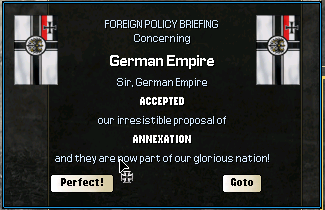 Makhno hated the man, to be sure. But his new Europe contained tens of millions of Germans who had grown up seeing him as a father figure, and tens of millions of French who had grown up hoping he would be killed. And that wasn’t even considering the Dutch, whose government was slowly accepting the Internationale’s program for integration but whose still very much regnant queen would have a lot to say about the fate of her shoestring relative. The man had been completely forgotten when he was in New Guinea. Now he was here, and he was a problem. Makhno couldn’t help but think Gitlow had done this on purpose. The ambassador believed that Gitlow resented Makhno’s grand tour across the continent, and all the fanfare that had come with it. It was also equally possible that Gitlow was just doing what he thought was the right thing. Either way, Nestor Makhno had to grin and thank the man for gifting him a big pile of poo poo.
|
|
|
|
So vergeht der Ruhm der Kaiserwelt.
|
|
|
|
Wilhelm II's been dead for a few years, right? This should be his son Wilhelm III, but I forget what he did while on the throne.
|
|
|
|
Nothing good.
|
|
|
|
Assuming similar death dates, Willy three would have been Kaiser for the entire wartime period.
|
|
|
|
 This was the German government at the end. I assume that a lot of the civilians had stayed behind. I can't imagine Einstein was up in the Owen Stanley Range with Willy. The Zentrumpartei had won in 1940 (iirc) and of course this is Darkest Hour where everything is event driven so I think they would have stayed in power forever until an event got rid of of them.
|
|
|
|
Einstein being relocated from Berlin to Africa to the Pacific Islands is a really funny concept.
|
|
|
|
Plutonis posted:Einstein being relocated from Berlin to Africa to the Pacific Islands is a really funny concept. It kind of amuses me that in this timeline, "okay, Einstein" is not a sarcastic put-down to someone who thinks they're smart; it's probably, like, a sarcastic put-down to a world traveler who won't stop talking about how much everything in other places sucks compared to home
|
|
|
|
Chapter Seventeen: The Last Bulwarks (July-September 1946) Author’s note: This update and the previous update are a bit jumbled chronologically. It took some time for the other nations to actually get all of Germany’s VPs so I could annex the Empire, hence why you see some Germany still around in this update. Everything in this update and last occurred between June and September 1946. Against ‘Linkage’: The New Pseudo-History of 1946 By Dr. Daniel Nkembe, Professor of History, Lumumba University Published in The African Journal of Revolutionary Military History January 1985 A mentor of mine once told me that counter-revolutionary thought is as the Hydra of Greco-Roman myth. Every time we wrangle it down and deliver a killing blow with our reasoned critiques and thoughtful research, more heads appear, and the struggle continues anew. While I am unsure what the intellectual equivalent of cauterizing its necks would be, I do find the analogy to be useful. During the socialist revolution’s journey from a fringe movement to world hegemony, counter-revolutionary thought has shifted. After each defeat, it retreats for a time, then appears anew, often aping the language which had been used to debunk it in the first place. One may consider as an example the historiography of the American Confederacy and how a war about slavery had, in the imagination of embarrassed racists in a post-chattel slavery America, become a war about liberty from Northern industrialists and the federal government. It became a lie told so often that its tellers began to believe it. I do not intend to color all proponents of the “linkage” theory as akin to supporters of the Lost Cause, nor do I intend to label them as counterrevolutionaries who seek to subvert socialism. I instead believe they are counterrevolutionaries in the context of a different revolution: a quieter revolution in which the “others” who exist on the periphery of the Franco-American Biarchy are reordering the socialist alliance. The others (by which I mean the socialist nations of Latin America, Africa, and Asia) are asserting their right to tell their own stories and express how the West’s efforts to export revolution affected them, without apology or filtering to protect the feelings of those in the West. These stories bring up thorny questions that are not easy to answer. Westerners can react to this discomfort in a number of ways, but broadly speaking, they can either accept the responsibility to challenge their assumptions and engage their comrades in honest dialogue, or they can seek to undermine and deny the source of that discomfort. The linkage theory is an example of the latter approach. The belief in an imminent “League of Four Emperors” was widespread in 1946. This belief stemmed from propaganda from the highest levels of power in Chicago. We now know that the prospect of this League was never taken seriously in Japan nor China, the only two members of the proposed alliance who had something to lose from its formation. Nevertheless, the belief persisted long into the 50s, repeatedly broadcast by those seeking to defend the conduct of the Combined Syndicates. Over time, the proponents of this theory became more and more conspiratorial and delusional, accusing an increasing number of supposed bad actors of hiding the smoking gun that would prove them correct. Most proponents abandoned the theory and moved on, and now the only matter of controversy is how sincerely those in power believed this narrative, if at all. Did these proponents examine their beliefs fully and come to understand what motivated them to buy into a false idea? Some surely did, and I applaud them. However, most likely did not. Instead, like the Hydra grows new heads, they develop new theories that are superficially distinct from that which had fallen out of favor but point towards the same essential conclusion: that America didn’t do anything wrong. This is the source of the linkage theory. For those unaware, the linkage theory gets its name from a talk given last year by Dr. Phillip Sheridan of Rutgers University. He did not originate the idea, but he was the first to use the term and it has served as a handy shorthand for the position. The basic idea is that while there was no explicit alliance between Japan and Australia, there was a “linkage” between the two. What does this mean exactly? That is an excellent question. Some of us are still waiting for a clear answer. The linkage theory has become more popular due to a recently renewed American interest in interventionism. Five years ago, when Canada’s domestic turmoil threatened to spiral into civil war, America intervened and forced the military to stand down, averting bloodshed and ushering in integration between Canada and its neighbors. This relatively bloodless operation has emboldened American interventionists, and it is now a mainstream opinion to think that a similar approach could bring about a good outcome in Britain, China or Turkestan. The context of the regime having virtually no public support and the geography of Canada making it incredibly vulnerable to American invasion often goes ignored. All of the above is my opinion, and ultimately not within the scope of this article. I include it because the proponents of linkage will surely have a lot to say about me when this article becomes widely read. I might as well state my position on these issues up front so that my motivations for exploring this topic are clear. With all of that being said, let us now discuss the theory, or what passes for it, in detail. ”Dr. Phillip Sheridan” posted:It has been the fashion, for some time now, to act as though Chairman Gitlow had invented a phantom out of whole cloth when he worked to preclude Japanese and Australian collaboration. While indeed the fear of a quadripartite alliance was based on faulty intelligence, it is undeniable that there was a linkage between the two powers’ actions that demanded a response. Dr. Sheridan’s comments spurred the growth of the Hydra’s newest head. It has not taken long for the term to make its way to the Chamber of Delegates in Chicago, where a member of the Subcommittee on History Education Standards recently demanded a vote on mandating the discussion of linkage when covering the Pacific War. The motion was never voted upon as the delegate, tellingly, failed to provide any documentation about what this would include. This is not a reason to dismiss the potential of this theory gaining ground, however. The next time such a proposal comes before the Subcommittee, we should expect it to be more cooked through than this one was. The most ambitious attempt to flesh out this theory comes from a piece published by Greta Harriman in the Western History Review. I am unfamiliar with the author or publication, but it is apparently popular in certain Chicago political circles. The piece begins with a review of the Japanese political situation. It is superficial and not insightful. There is a great deal of excellent scholarship about the complexities of Japan’s politics in 1946, and new translations of excellent Japanese scholarship appear every year. Hotta’s works come to mind, but I could recommend several others. It is clear that Harriman did not bother reading any of it. Harriman cherry picks the most aggressive sentiments she could find from American sources. 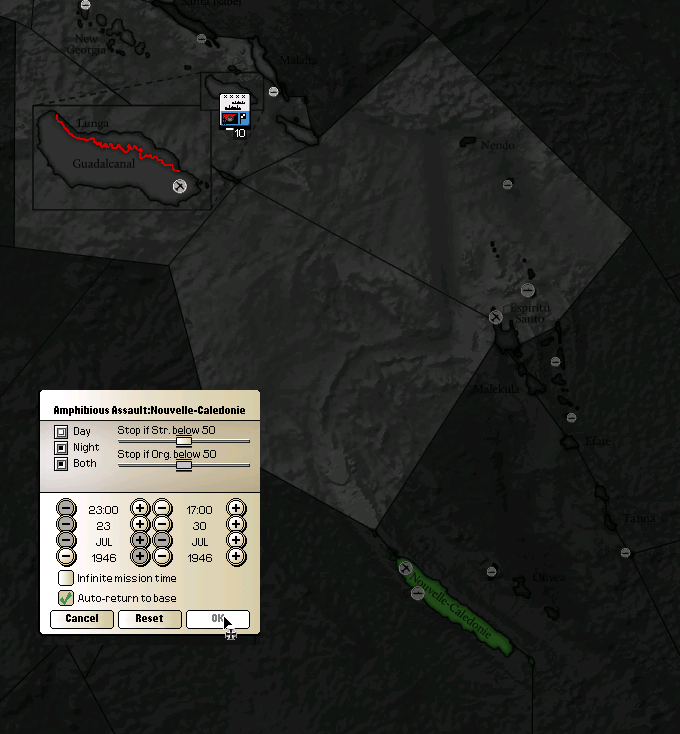 The capture of New Caledonia by the Revolutionary Marines in July of 1946 caused something of a panic in Japan. Hotta explains this well in her work Shōwa 21. Any Japanese with a memory of recent events were familiar with New Caledonia as it had been transformed into a major regional base by the German Empire. During the 1920s and 30s, when Japan held out hopes for a negotiated settlement with the Reich to allow Japan more access and influence over the South Pacific, the expansion of the port facilities in New Caledonia made it clear that the Reich saw no reason to cede its position in the region to anybody. For this reason, the fall of New Caledonia spurred the Japanese public to take an increased interest in the war between America and Australia. The capture of New Guinea was considered to be both irrelevant and inevitable. Obviously, the Americans were going to smoke the Kaiser out of his hiding place to achieve a final victory. New Guinea was also considered, rightfully, a backwater with minimal facilities. In fact, it was chosen by the Kaiser as his refuge because it had a deep and forbidding interior that he hoped would dissuade invaders. New Caledonia on the other hand was interpreted as a clear signal that the Americans were prepared to see their war with Australia through to the end, as its facilities were a much more suitable staging ground for an invasion of Australia than New Guinea. It is several hundred kilometers closer to Australia than New Zealand, providing greater opportunities for bombers to support any landing. New Caledonia had been a symbol of Germany’s desire for a permanent dominion over the South Pacific, and now it belonged to the Americans. 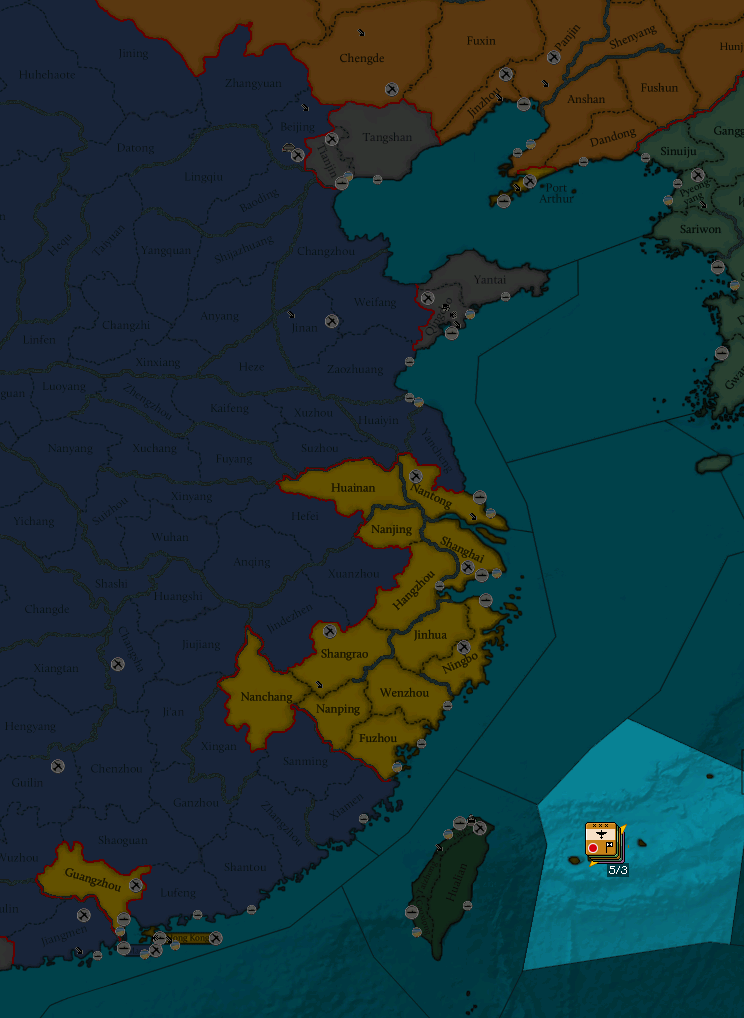 This development coincided with an acceleration of Japan’s progress in Southern China. As Hotta explains, the prevailing attitude when the Qing attacked Manchuria was concern. Japan had become accustomed to a divided China during the years of German influence, and a united China was a frightening new development. It was not an uncommon opinion in liberal circles that Manchuria ought to be handed over to China and an alliance sought on equal terms. The idea was never seriously considered, but the fact it was espoused at all by Diet members reveals just how mainstream the fear of a united China had become. However, this concern evaporated as the Qing advance into Manchuria completely stalled and the Japanese invasion of southern China met no serious resistance. 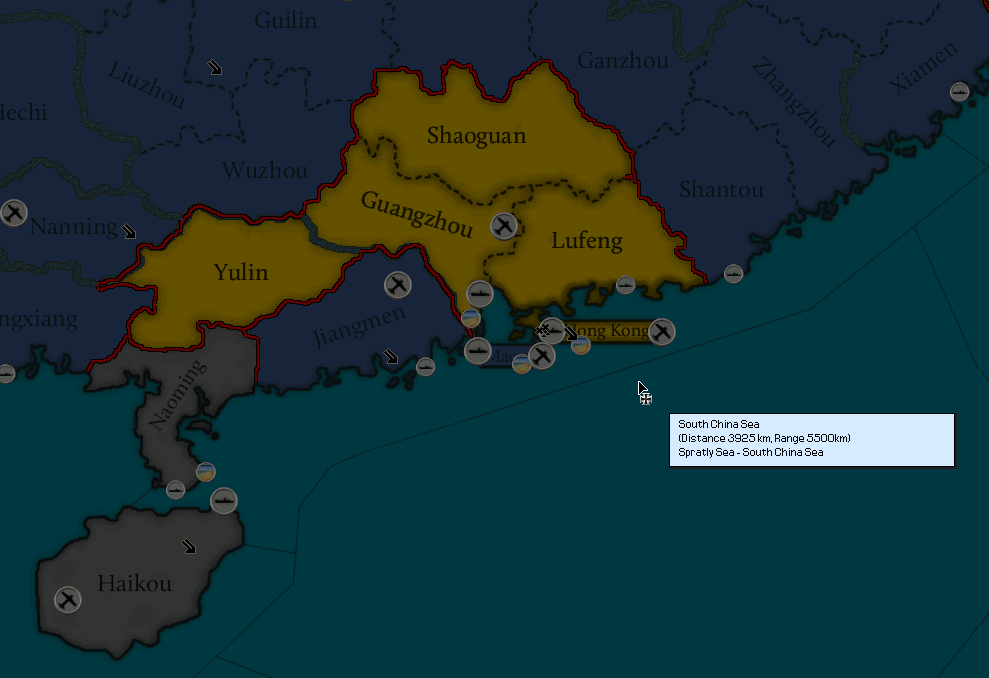 The American capture of the Kaiser and Gitlow declaring open season on the Reich’s remaining outposts unintentionally aided the Japanese cause even further, as Japan now had permission to seize Germany’s well developed port facilities on Hainan island. Combined with the rest of the major ports of the Pearl River Delta, Japan found itself with an embarrassment of riches in terms of logistical capability in Southern China. All of this led to a bout of wild optimism in Japan, as defeat of the Qing by the end of year seemed not only possible, but probable. With concern about Japan’s ability to win the war against the Qing fading away as quickly as Qing’s military, public discourse shifted to what the post-war situation would look like. The question of who East Asia’s preeminent power would be was definitively answered. The issue was now what Japan would do with this power that everyone assumed was a year or less away. Harriman leans heavily on statements from these most heady days of Japanese triumph. Of particular interest to her is a group of radical Imperial Japanese Army officers who believed that Japan should aggressively expand its sphere of influence to include the Philippines, Indonesia, Siberia, and critically, Australia. The most outspoken of this faction was General Hideki Tojo, who believed that Japan’s defeat of China would lead to it becoming the equal of America on the world stage. He had even begun to believe that Japan was in a position to mediate an end to the war between La Plata and Brazil whether America condoned it or not. What Harriman omits from her telling is that this faction was not in power and had little to no influence over mainland politics at this particular point. General Tojo ruled his operational area in China like a personal kingdom, but that was all that he ruled. The Imperial Japanese Navy, far more moderate and internationalist in its outlook, was relatively united in its support of a more measured approach to expanding Japanese influence. Siberia’s conservative parties advocated closer ties to Japan while its ruling social democrats sought increased economic ties with the Internationale. An election that went against the left could have delivered Siberia into Japan’s sphere peacefully, while aggressive action could force Siberia to seek Internationale aid. The Philippines sought neutrality above all else but were more than willing to trade with the Japanese already. Most importantly, Japan had accumulated a tremendous amount of material interests in the Dutch East Indies. The mainstream in Tokyo was inclined to agree with the Navy’s assessment that staying the course was their best path forward. Japan was going to win the war against China, and that was good enough to keep the Internationale at bay. Tojo’s deranged ambitions never held much purchase in the capital. Harriman’s assessment of Australian politics is far more accurate, though this is to be expected as the situation was not as fluid and there are no issues of translation. Australia had been in a state of siege for many years which had only intensified in 1944 and 1945. The end of the war in Europe and the liberation of Hawai’i had greatly increased the ability of the Red Navy to punish Australia and starve it of imported supplies. The Page government remained in office indefinitely thanks to emergency powers granted by the King, who had been resident on the continent since 1940. A peace coalition of pragmatic moderates and the left may well have been able to win an election, had one been allowed. Instead, the peace movement was relegated to closely monitored demonstrations, and, in the case of the few revolutionaries able to evade the military police, sabotage. The Laurentian counter-revolution further complicated matters as it became clear that any negotiated peace must include the handover of the King and any British exiles who had been a part of the plot. While many Australians were more than willing to give up the monarchy for peace, the personal danger to the King motivated those with royalist sympathies to continue supporting the emergency government. 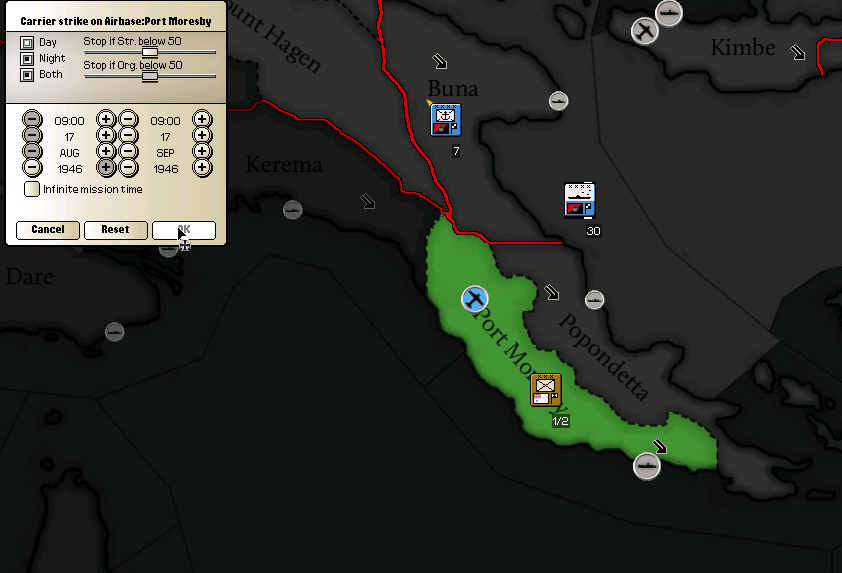 Where Harriman enters into the realm of fantasy is by ascribing motive to Australian operations in this time frame with only the most tenuous links to the evidence we have. She takes particular interest in the repeated proclamations of Australian propaganda that New Guinea would “become a graveyard for the American invaders”. She asserts that “the Australians heavily reinforced Port Moresby with bombers and fighters.” The use of the word heavily here is wishful thinking.  Only a handful of Australian bombers and fighters were able to make it to Port Moresby before the airfield there was utterly obliterated by a Red Navy carrier raid. Propaganda was likely more intended to calm the nerves of the public as the invaders inched ever closer to the mainland, rather than a signal of any actual strategy to make the island a decisive theater. 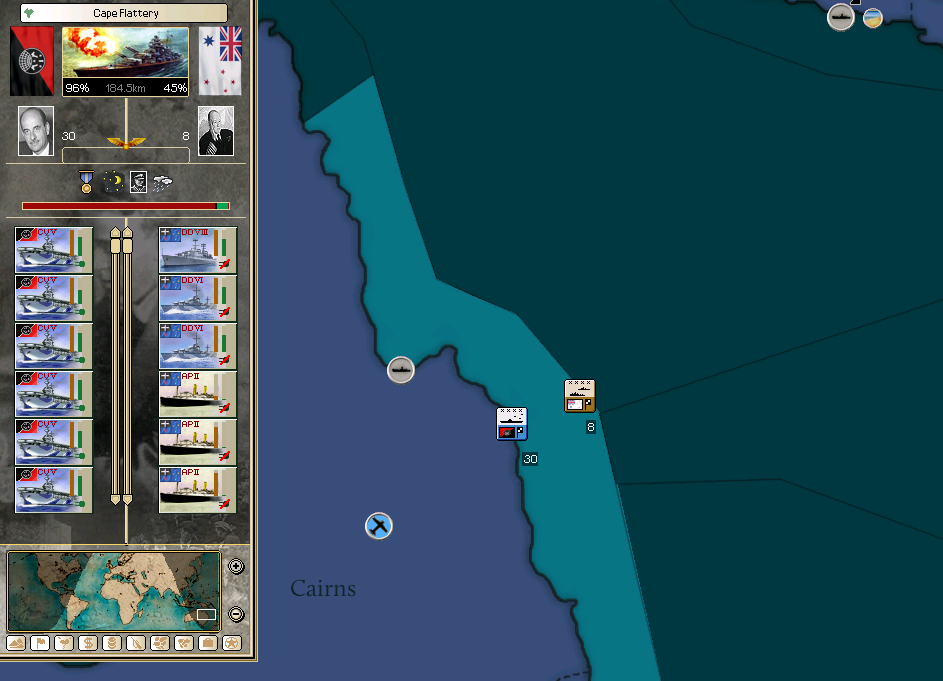 Harriman also puts a lot of stock into the interception of an Australian flotilla in the Coral Sea. Harriman indulges in some unsourced speculation by saying “they may have been used to reinforce Port Moresby.” A review of declassified signal intercepts finds no discussion of a mission to reinforce Port Moresby with ground forces, but several calls to evacuate the white settlers of Australian New Guinea. It is far more likely that these ships were intended to carry the colonists back home. Australian command understood white settlers found in plantation colonies such as New Guinea were subject to harsh treatment, especially considering the number of Australian colonists who had been arrested in Fiji. The Entente’s supreme naval commander Patrick Perry had written the Minister of Home Affairs Alexander McLachlan regarding a plan to resettle the New Guinea colonists in Australia, and to destroy all records that they had ever been to New Guinea or owned land there. The hope was that this would save these colonists from being singled out, as they could pretend to be ordinary Australians. 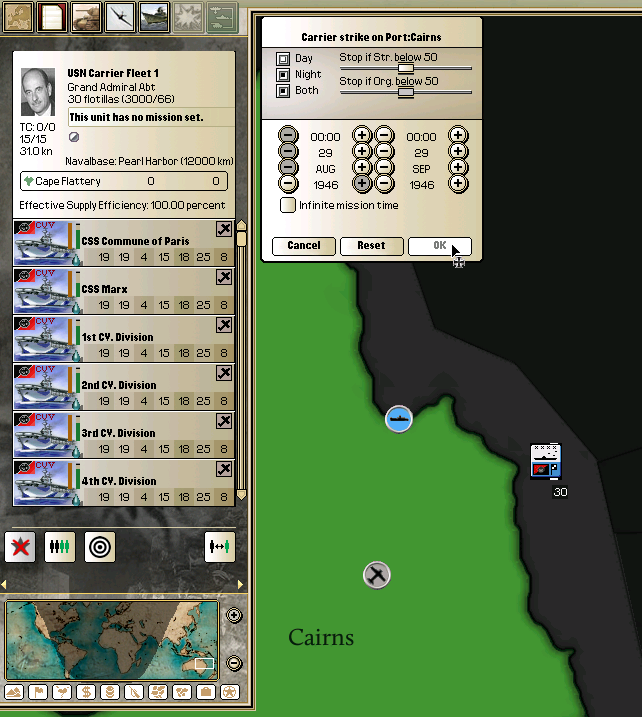 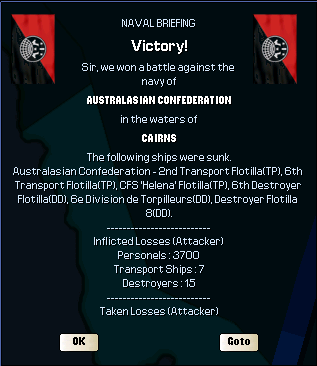 Events moved too quickly for the plan to ever be carried out. The Red Navy unleashed a furious raid on Cairns on August 29th that rendered its harbor almost unusable. Harriman credits this raid with preventing Australian reinforcement of New Guinea, ignoring the mountain of evidence that suggests Australia was instead planning an evacuation. 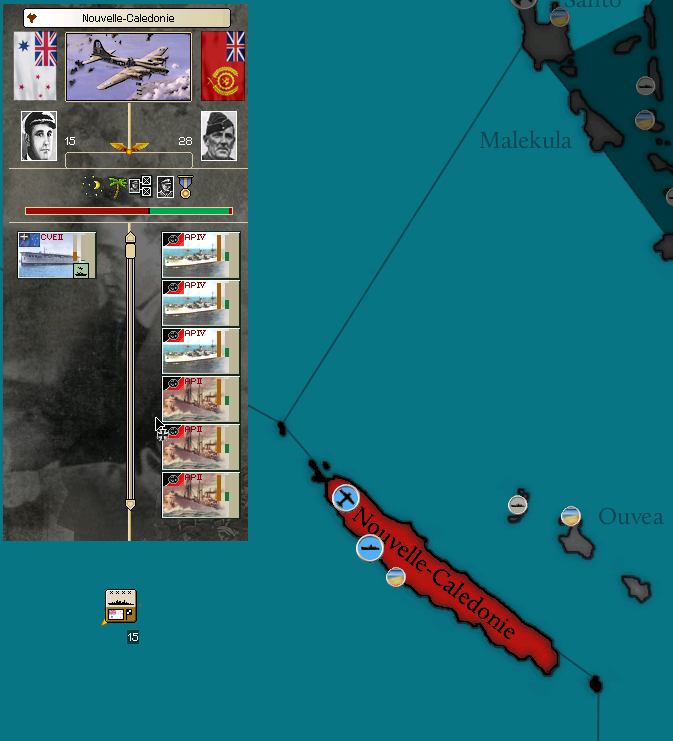 The final operation which Harriman focuses on is the desperate air raid launched against New Caledonia by the escort carrier HMS Hermes on September 2nd. The attack was unexpected but ultimately ineffectual, damaging only a couple of unguarded transport ships that were quickly repaired. 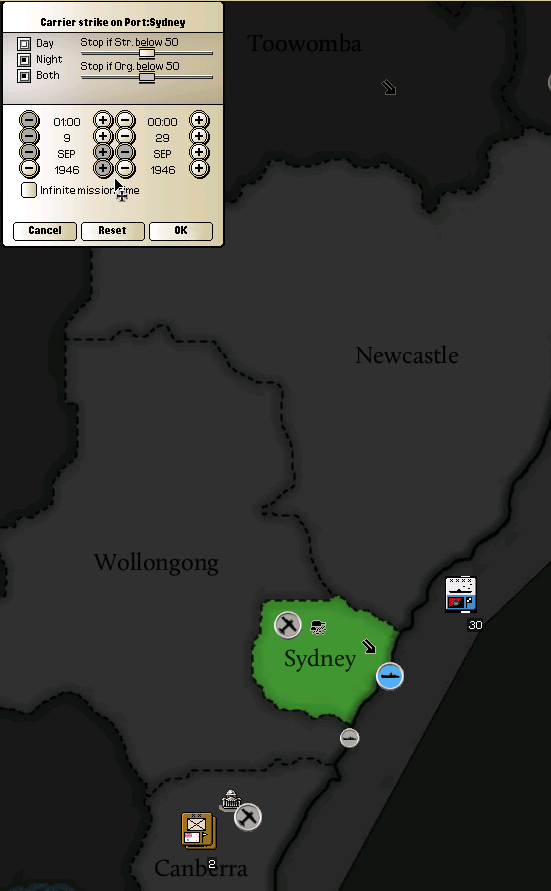 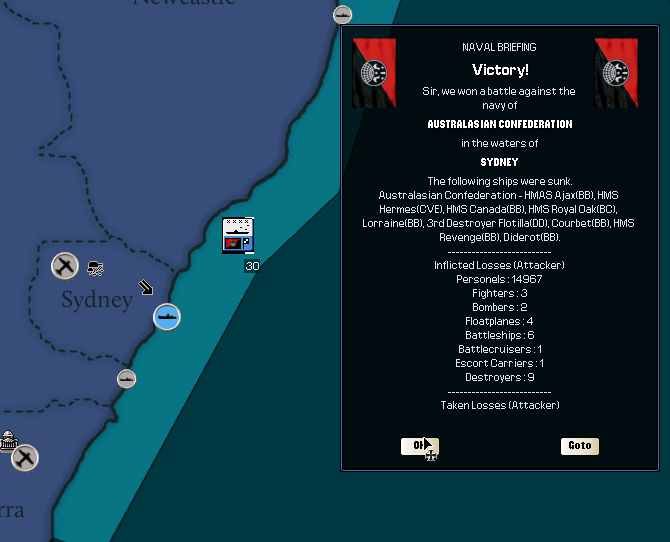 The raiders were tracked down and followed to Sydney, where the Red Navy paid them back one hundredfold, sinking six battleships and the offending Hermes. Harriman also attributes far too much importance to this exchange. The Red Navy had been able to sink Entente ships in Sydney harbor at will for all of 1946, and the Entente fleet had accepted the fact of its eventual destruction. The raid by the Hermes was, simply put, preferable to just waiting to be sunk. How does Harriman draw all of this together into a cohesive theory? She tries her best, but ultimately fails. Her “smoking gun” is the existence of a diary entry by King Edward VIII in which he says that the only hope for Australia is to buy time until “deliverance.” This one diary entry bears so much load in Harriman’s construction that any building inspector worth their salt would condemn this entire edifice. Harriman ends her piece by drawing all the threads together into one incredibly specious conclusion: that Australia hoped to stymie the American advance long enough for Japan to win their war against China and establish a great Asian alliance. This would force America to come to the negotiating table and accept a Japanese sphere of influence that included a still monarchist Australia, an outcome prevented only by American action. Therefore, while there was no prospect of a direct alliance between Australia and Japan, there was a “linkage” that demanded disruption. Extrapolating any great significance from the King’s hopes for an external force to “deliver” him is foolishness. The King was a religious man, and he had faith that his God would see him through all of the trials his Empire had faced. That is all that his language meant. Obviously, Australia hoped for Japan to intervene. Fans of the Ethiopian football team also hoped for a large bird to fly into and injure Congo’s strikers when the Walias were down 4-0 in the Cup of Nations final last February. When no hope exists, some men are prone to fantasy. (Apologies to Ethiopian readers for the teasing, I could not help myself.) Here we see the Hydra in action. Harriman has done us a great service with her piece by making an attempt to flesh out an absurd idea. There is a reason that Dr. Sheridan and his political friends merely allude to the theory, because they know deep down that the theory holds no water. Keeping its exact definition fuzzy serves their purposes. Defining the idea forces it to stand up to scrutiny, which it cannot. The belief in the League of Four Emperors was decapitated long ago, and here we see its descendant taking up the mantle of apologism. We must not allow this type of retroactive propagandizing to be taken seriously in our field. We should not be tempted to lend oxygen to this farce simply because influential figures in Chicago will invite you to their parties if you say what they want to hear. Respect our craft and respect yourselves. Denounce the theory of “linkage.” csm141 fucked around with this message at 03:20 on Dec 12, 2022 |
|
|
|
Red Army has to be landing in Australia soon, yeah?
|
|
|
|
Honestly I thought we'd already invaded them (That was probably just us bombing them)
|
|
|
|
Academic disputes! Controversies in historiography!
|
|
|
|
Inappropriate tone and anecdotal asides for a journal article! 
|
|
|
|
Firstly, nice reference to Patrice Lumumba. I know that there used to be a RL university with his name, but it was renamed. I appreciated the nod. Secondly, and this is almost certainly something that was mentioned earlier in this venerable LP, but why is there a picture of Edward VIII but called Edward VII? You mentioned Edward VII later in your own typing as well. I know that this is alternate history, but again the photos are wrong and Edward VII died in 1910. Even in a fictional history it woudl be a major stretch to have him king of Australia in 1946; he'd be over 100. Edward VIII being king of Australia in the 1940s is, however, entirely plausible.
|
|
|
|
Hmm, Lumumba wouldn't be an anti-colonial activist if Africa was liberated when he was a teenager, would he? (Although Kwame Nkrumah could work there!)
Plutonis fucked around with this message at 03:52 on Dec 11, 2022 |
|
|
|
JustJeff88 posted:Firstly, nice reference to Patrice Lumumba. I know that there used to be a RL university with his name, but it was renamed. I appreciated the nod. i am a servant to whoever made this version of Kaiserreich which has surely been updated 30 times since I started this LP
|
|
|
|
Upon further examination, the font that Darkest Hour uses there blends the Is together very easily. Opening up the actual screenshot and zooming in some more, we see that I am in fact a buffoon playing an ancient video game. lemme go ahead and edit that This version of KR definitely has a lot of oddities as things have gotten much more fleshed out in the years since (for better or worse I suppose, I hear things but haven't played them). I know that there's some leaders in African nations in this version I played who are 12 when installed as leaders of released puppets. csm141 fucked around with this message at 04:29 on Dec 11, 2022 |
|
|
|
Kavak posted:Inappropriate tone and anecdotal asides for a journal article!
|
|
|
|
csm141 posted:
I'm one too, that isn't an excuse! Uh, I mean, shut up syndie!
|
|
|
|
I assumed that it was a visual quirk, but I looked at that caption for several minutes and I could not see a third bar.csm141 posted:
I once wrote the word 'bollocks' in a conference paper, so I'm on your side here.
|
|
|
|
csm141 posted:The belief in the League of Four Emperors was decapitated long ago, and here we see its ancestor taking up the mantle of apologism. That should be descendant. 0/10 would not read again.
|
|
|
|
Academic disputes are some of the most fun to read about, especially when you're not involved in them.
|
|
|
|
It's all just so very catty.
|
|
|
|
csm141 posted:
If it were a real academic history article it would be like 30 pages long so I think "opinion piece full of sniping" was the right genre to use here tbh
|
|
|
|
Lynneth posted:That should be descendant. 0/10 would not read again.  thanks for catching it What happens is I edit these things, read the first 40% fifteen times, rework it, unrework it, rerework it, then I say to myself "for gently caress's sake, tim, just post the update" and I miss whatever was left.
|
|
|
|
Really nice to see this keep ticking along. I saw that Britain is now on the American's official shitlist, I assume this is because of their Neccessary Acts To Secure The Revolution Against Further Counterrevolutionary Elements. Interesting that they appear to have more popular support than the Canadians did at least, I suppose the Maximalists were voted in to power.
|
|
|
|

|
| # ? Apr 19, 2024 12:15 |
|
I'm on a moderate hiatus at the moment because it is Christmas and I am moving next week (to another part of New Jersey, nothing too exciting). I just want to reassure you all that I have plans and outlines and want to keep this LP constantly cooking until its done. Happy holidays and see you in the New Year.
|
|
|
























